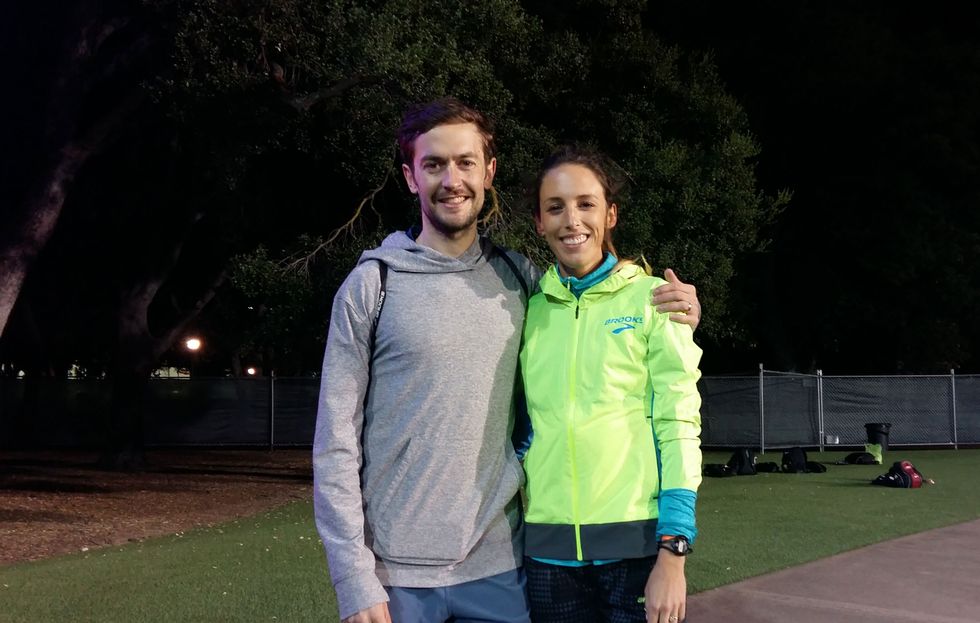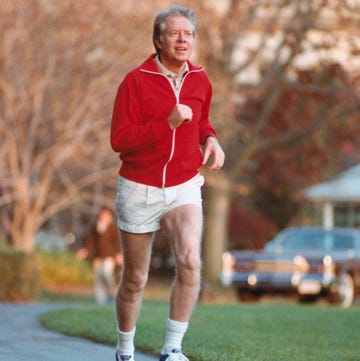As the clock ticks past two minutes, the first signs of stress announce themselves on Gabriele Grunewald’s face.
Her eyes narrow to a squint, as if she’s straining to read a distant road sign, and her mouth clenches. As fatigue takes hold, the muscles in her neck tighten, slowly pulling her vision skyward.
Up ahead, she is faced with a demoralizing sight: Her seven rivals are escaping into the distance. They are athletes whom Grunewald could beat by several seconds at her best, but that was then and this is now. Tonight, on a cold Friday evening in Palo Alto, California, things are different.
For the fourth time in eight years, Grunewald, 30, is fighting cancer.
So why is she here, suffering through a 1500-meter race at the Payton Jordan Invitational, when it seems there are thousands of better things to be doing?
“I love running,” she said. “It gives me a bit of an escape from all the other stuff I’m dealing with. I can’t fully escape, but I try, and there’s success in just trying—in not giving up the things that are meaningful to me.”
In 2009, Grunewald was diagnosed with adenoid cystic carcinoma in her salivary gland, a rare form of cancer for which there is currently no cure. She underwent surgery to remove the gland and the tumor, but two years later it returned, this time in her thyroid. After another surgery, she returned to full health, and in 2014 became the U.S. indoor 3,000-meter champion and reached the world indoor final in Sopot, Poland.
Last year, however, the cancer came back, and Grunewald had surgery to remove a large tumor from her liver, which left a 13-inch scar arcing down her torso.
In the video below from the U.S. Olympic Trials in July 2016, Grunewald discusses with Runner’s World the uncertainty of her health and how she inspires young runners with cancer. A few weeks later, she discovered her cancer had returned.
She thought, then, that the worst of it was behind her, but in March a routine scan delivered news she was dreading: There were now several small tumors in her liver.
“It was devastating, one of those moments where life gets heavy,” Grunewald said. “My disease is now metastatic, so it’s not in the primary location. This is definitely scarier.”
She faces a pivotal week, as Grunewald will fly from her home in Minneapolis to New York for an appointment with a world-leading specialist to discuss treatment options.
“I don’t know if I’ll feel better or worse after talking to him,” she said. “There’s some anxiety because I don’t know what’s coming.”
In many ways, the future is too daunting and unpredictable for serious thought, so Grunewald prefers to narrow her focus, the way she does in her hardest races—lap by lap, day by day.
“I’m trying to keep hanging on, each day,” she said. “I’m hopeful I’ll keep surviving and the days will turn into weeks and months and years and one day I’ll wake up, be 50 years old and I’ll be at Disney World with my kids.
“But,” she said, “I don’t know.”
Midway up the back stretch of the Stanford University track, a man with the build of a distance runner stands alone in a gray hoodie, his eyes trained on the track.
He mostly watches in silence, but occasionally he’ll shout a few words of encouragement at the woman he calls “the toughest person I’ll ever meet.”
Back in 2004, while a freshman at the University of Minnesota, Justin Grunewald plucked up the courage to ask out Gabriele Anderson, as she was then, though sparking her interest was no easy task.
“She was kind of standoffish,” he recalled with a laugh, “but I pursued her for a little while and we ended up dating.”
They have been an item ever since and married in October 2013.
STAY INFORMED: Nutrition - Weight Loss
Justin Grunewald, a doctor who has two months left in his residency, has an unparalleled insight into his wife’s life, and it’s inevitable that they share the burden of her disease.
“It gets hard,” he said. “Some days you don’t want to get out of bed, some days you start crying in the shower, but you just suck it up and say, ‘What’s the point in living that life if there’s so much more to be doing?’”
The day after her most recent diagnosis, he took Gabe—as many know her—to their local track for the best therapy they know: hammering 200-meter repeats.
“That pain feels better than the other pain,” he said. “It was absolutely terrible to receive the news, but you bawl and cry and then you go for a six-mile run and it feels less bad. Everything does. Running is super therapeutic; it works better than anti-depressants, anti-anxiety drugs, and it’s benefited her hugely.”
As a former high-level athlete who competed in the Olympic Marathon Trials in 2012, he’s there with her for every workout, still amazed at how fit and fast she is.
“She’s so tough and can handle so much,” he says. “She has cancer in her liver and she’s out there killing workouts. People all over the place are dealing with cancer, but if they can look to her story, they’ll see the therapeutic benefit of running.”
He’ll be there in New York on Tuesday, too, as they discuss treatment options with the specialist. Though Justin Grunewald is well aware of the severity of his wife’s cancer, he’s on the pulse of every available option that might uncover long-term hope—reeling off the names of the centers doing clinical trials in the hope of finding a cure.
“More and more come out,” he said. “You just have to stay alive to receive them.”
Cancer bestows a profound gratitude for living, but sometimes it’s easiest to focus on the small pleasures.
“I have such a great appreciation for everything but it’s a hard balance, because taking that perspective can make everything heavy,” Grunewald said. “I want to live a normal life, and things like running with Justin is something I look forward to every day.”
Last Wednesday, the Grunewalds flew to the west coast a few days ahead of the race in Stanford, using the trip as a chance to catch up with an old friend from the University of Minnesota.
These days, Mallory Van Ness is an architect in San Francisco and a recreational runner, but when she first met Grunewald they were college teammates in Minnesota.
They’ve been close friends ever since, close enough that Van Ness is unable to hold back the tears when she talks about her friend’s cancer.
“I’m always the one crying and she’s always very positive about it,” Van Ness said. “Gabe is like, ‘I’m gonna be fine!’ but I know behind the scenes she’s dealing with it in her own way. She doesn’t want people to be worried or upset.”
A couple of nights before the meet, Van Ness joined her old teammates for pizza in San Francisco and she was also there, shivering in the cold and shouting her support, when Grunewald toed the line at Payton Jordan.
“Gabe is always positive, excited and hopeful,” she said. “She’s not going to let something stop her doing what she wants to do.”
***
One lap to go, and Grunewald runs alone.
Her pace has slowed, and in her pained expression it’s clear how much effort she’s investing. Up front, her rivals launch their finishing kicks, pulling them farther ahead of Grunewald.
The race winner, Karoline Bjerkeli Grovdal, runs 4:10.74, and by the time the second-to-last-finisher crosses the line, Grunewald still has 30 meters to run. She covers it like it’s an Olympic final—all grimace and grit as she crosses the line in 4:20.17.
ALSO SEE: Doctors said woman would never run again. She proved them wrong
The time is 19 seconds off her best, but she retains her resolve.
“I wish I could be a hero and come out here and win everything, but the truth is I might not be able to,” she said. “I’m still going to try. My best might not be what it used to be, but it’s still worth finding it on any given day.”
She knows she’s fitter and faster than that, so on Thursday evening she will toe the line again to race a mile on the streets of Minneapolis. After that her racing schedule will be built around her treatments.
It could be chemotherapy, immunotherapy, or a clinical trial, but no matter what they choose, Grunewald wants to keep running.
“There will be a time, whether that comes in the next few months or weeks, when I might not be able to race for a while,” she said. “But running is just good for me, physically and mentally, so I want to see what’s possible while I’m going through this.”
In recent months Grunewald has shared much of her journey on social media and admits she has been overwhelmed by the flood of support coming her way.
If anything, she hopes telling this tale will inspire those facing similarly daunting odds—those out there clinging to hope the way she always has and always will.
“It’s important for me to step on the starting line even if I’m not kicking everyone’s ass,” she said. “I’m doing my best, and that’s what my story is about.”

Cathal Dennehy is a freelance writer based in Dublin, Ireland, who covers the sport for multiple outlets from Irish newspapers to international track websites. As an athlete, he was Irish junior cross-country champion and twice raced the European Cross Country, but since injury forced his retirement his best athletic feat has been the Irish beer mile record. He’s happiest when he’s running or writing stories about world-class athletes.













